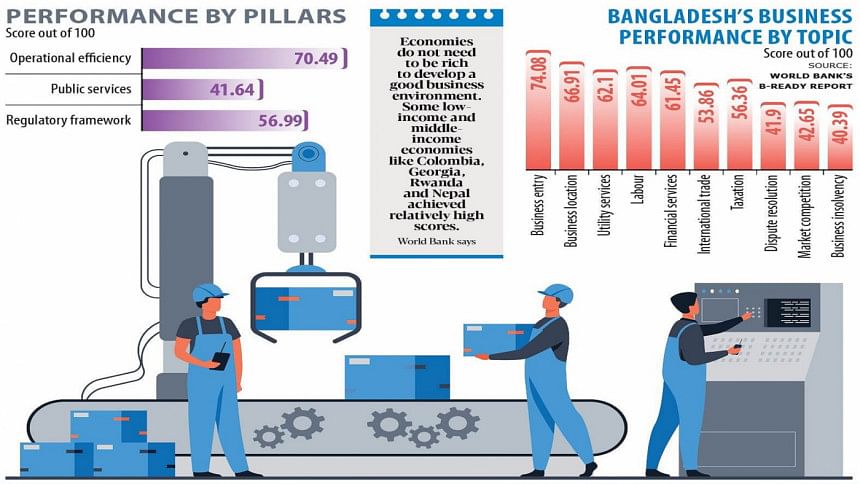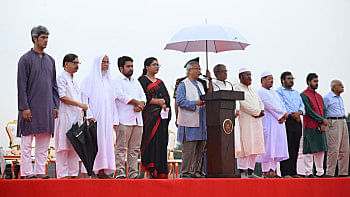Bangladesh still stays at bottom in business environment

Bangladesh remains near the bottom among 50 countries in providing a conducive regulatory framework for businesses, according to a World Bank report, as the country trails even its neighbours Nepal and Pakistan.
The Washington-based multilateral lender's Business Ready (B-Ready) report, which was released yesterday, also places Bangladesh in the fourth tier of five stages for public service delivery, indicating weaker performance in this area too.
In operational efficiency, the WB places Bangladesh in the second stage against a total of five tiers.
The B-Ready report replaces the World Bank Group's discontinued "Doing Business" report.
Based on data collected directly from experts and enterprises, the World Bank scores countries on ten topics, each with three pillars: regulatory framework, public services and operational efficiency.
Each pillar score is standardised on a scale of 0 to 100, and the overall score is calculated by averaging the scores across all ten topics.
The ten topics evaluated include Business Entry, Business Location, Utility Services, Labor, Financial Services, International Trade, Taxation, Dispute Resolution, Market Competition and Business Insolvency.
In terms of regulatory framework, Bangladesh scored 56.99 out of 100, placing it in the bottom quintile among the 50 economies.
The Regulatory Framework pillar assesses the effectiveness of laws and regulations in promoting good practices. Hungary led in this area with a score of 78.23, while neighbouring Nepal and Pakistan both surpassed Bangladesh with scores of 59.34 and 59.10 respectively.
For public service delivery, which measures the institutional provisions, including government facilities for regulatory compliance and the infrastructure supporting business activities, Bangladesh scored 41.64.
With a score of 73.31, Estonia tops the pillar. Among neighbouring countries, Nepal scores 49.29 and Pakistan scores 44.97 -- both performing better than Bangladesh.
In the operational efficiency pillar, which evaluates both the ease of compliance with regulations and the effective use of public services as perceived by experts and firms, Bangladesh's score is 70.49, compared to the highest score of 87.33, secured by Singapore.
Also in this area, Nepal and Pakistan beat Bangladesh, with scores of 72.21 and 65.90 respectively.
Apart from the pillar performance, B-Ready also presents information on economic performance at the topic level.
Bangladesh scored 74 points in business entry, followed by business location 66.91, labour 64, utility services 62, financial services 61 and taxation 56.
Business entry includes information and procedural standards, business registration restrictions, digital services and online information transparency.
The business location covers property transfer systems, environmental permits and digital services. Utility services assess quality, infrastructure, safety, reliability, digitisation and environmental sustainability.
The labour topic assesses labour rights, minimum wage, social protection and skilled labour availability.
The financial services topic encompasses funding availability, transaction security, e-payment systems and collateral systems. Clarity, transparency, administrative procedures, digital services, tax dispute management and effective tax rates are included in the taxation topic.
Bangladesh's scores in international trade, market competition, dispute resolution, and business insolvency are 54, 43, 42 and 40, respectively.
International trade includes regulatory restrictions, digital and physical infrastructure and trade compliance.
Dispute resolution assesses alternative dispute resolution systems and court litigation processes.
Market competition involves regulations promoting market competition and related public services. Business insolvency focuses on legal and procedural standards in insolvency proceedings.
A country does not need to be wealthy to develop a favourable business environment, the World Bank said in its key findings, referring to some low and middle-income economies like Colombia, Georgia, Rwanda and Nepal.


 For all latest news, follow The Daily Star's Google News channel.
For all latest news, follow The Daily Star's Google News channel. 



Comments